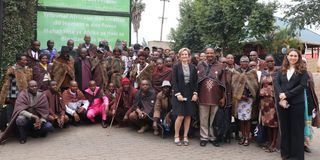State must implement Ogiek court award

Members of the Ogiek community at the African Court on Human and People's Rights in Arusha,Tanzania on June 23.
Last Thursday, the African Court on Human and Peoples’ Rights delivered a judgment on reparation for the Ogiek community.
Representatives from the community travelled to Arusha for the public hearing, which allowed them to fully embrace it.
We have waited for a long time for this judgment. Some elders with whom we began the fight for our land rights would have loved to witness this historic moment but have died.
The court gave specific directions to the government to uphold the rights of the Ogiek and compensate them for the historical land injustices against them.
The reparation judgment is clear and specific—unlike the May 26, 2017 one that was a blanket win. This verdict is specific in terms of compensation: Sh157 million for a community development fund. The ruling is clear on restitution whereby the Ogiek will be given their own land. That will be done under the Community Land Act 2016.
The government was also told to publish both judgments—the May 26, 2017 merits win, and this reparation award—in the official Kenya Gazette. That will ensure that it bears the responsibility to make the judgments public.
The reparation win incorporates the Ogiek from across the Mau forest complex. I’m sure the Ogiek would want to follow the nine claims, whereby there will be nine community titles.
The community expects the government to respect the judgment as they negotiate on issues concerning Ogiek lands and sharing of benefits accruing in Mau. But the Ogiek are afraid; they wonder if the government will really give them a hearing. Will it make time to collect views from the Ogiek community?
Restitution is the key win for the Ogiek. Yes, there is pecuniary compensation, but restitution remains the main take-home for them. Some prefer pecuniary compensation, which, in real sense, is little money.
And there are some areas where community members hold individual title deeds, such as parts of southwest Mau. Residents feel that an individual title is more important and fear returning them so that the land can be converted to community ownership. This is the major problem that I foresee.
Many Ogiek feel that pushing the government to implement the reparation is an uphill task. But anything that will henceforth take place in Mau Forest will adhere to free, prior and informed consent. That means the Ogiek will be negotiating with development partners from the private and public sectors on any project happening in Mau.
So, will the government implement the reparation judgment? If yes, how long will it take? Will it pay the monetary compensation, and how long will that take?
But we are hopeful. Our hope rests on the fact that, after a year, we will go back to court to showcase implementation progress.
Daniel Kobei, Nakuru




